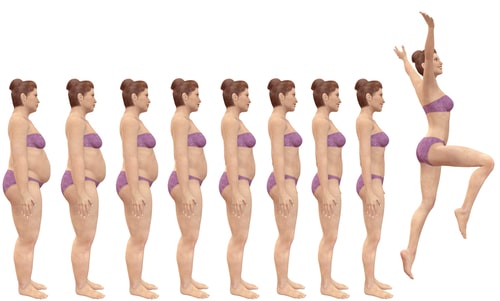
Fitness, Body Weight and Health
A study published in the journal Circulation looked at the issue of body weight and fitness and their impact on health. They measured the fitness level and BMI (body mass index) of over 14,000 middle-aged men, many of whom were overweight and a few who were obese, using a treadmill testing and metabolic equivalent scale. (MET). Then they followed them for over six years, closely monitoring their BMI and fitness level.
During the six-year study, men who maintained their fitness level were 30% less likely to die during the subsequent decade compared to those who let their fitness level decline – and those who increased their fitness level had a 19% lower risk of dying from heart disease. On the other hand, men who became less fit over the course of the study had a greater risk of death regardless of their BMI.
What does this mean? Being fit trumps body weight when it comes to the risk of dying prematurely. Staying in shape has health benefits regardless of weight – and it appears that you can be both “fit and fat.” Even though the participants in this study were men, researchers involved in the study believe the results would be similar for females.
Body Weight and Metabolic Health
Other research supports the idea that you can be overweight and healthy if you maintain a certain fitness level. One large international study found that obese people who are fit and healthy from a metabolic perspective have no greater risk for heart disease than normal-weight people do. The key is to stay metabolically healthy. That’s where exercise comes in. Exercise helps to improve metabolic health by preventing problems like insulin resistance and changes in blood lipids that lead to type 2-diabetes and hear
Exercise is one thing overweight and obese people can do to offset some of the risks of being overweight. Based on these studies, being fit and metabolically healthy is just as important as or even more important than body weight. People who are metabolically healthy have triglyceride levels, blood pressure, fasting glucose levels, and HDL and LDL cholesterol levels that are within the normal range, and exercise helps to improve all of these parameters.
Not all people who are normal weight are healthy from a metabolic perspective, especially those that are sedentary. Normal weight people can also be “skinny-fat.” Although skinny-fat people are within their ideal body weight range, their body fat percentage is too high, putting them at risk for problems that sedentary overweight and obese people develop. That’s why fitness trumps body weight when it comes to health, although both are important. Not all people of normal body weight are health metabolically or practice a healthy lifestyle. We all know thin and normal weight people who eat a poor diet and rarely exercise. Being slender doesn’t always equate with a healthy lifestyle
The Bottom Line?
You’ll be healthiest if you exercise and stay at a healthy body weight, but if you’re carrying around excess body fat, getting physically fit can still lower your risk for chronic health problems, especially if you maintain normal blood pressure, blood sugar level, triglyceride level, and LDL and HDL level. Fitness counts regardless of your weight.
References:
American Heart Association. “Physical fitness trumps body weight in reducing death risks”
Berkeley Wellness Letter. “When Fit Outweights Fat”
Obesity (2012); 20 11, 2202–2212.
Growth, Genetics and Hormones. “The Metabolically Healthy Obese: A Prospective Study on Risk of Development of Cardiovascular Events”
Related Articles By Cathe:
Physical Inactivity or Obesity: Which is the Bigger Health Threat?
Fitness vs. Body Weight: Which is Most Important for Health?

